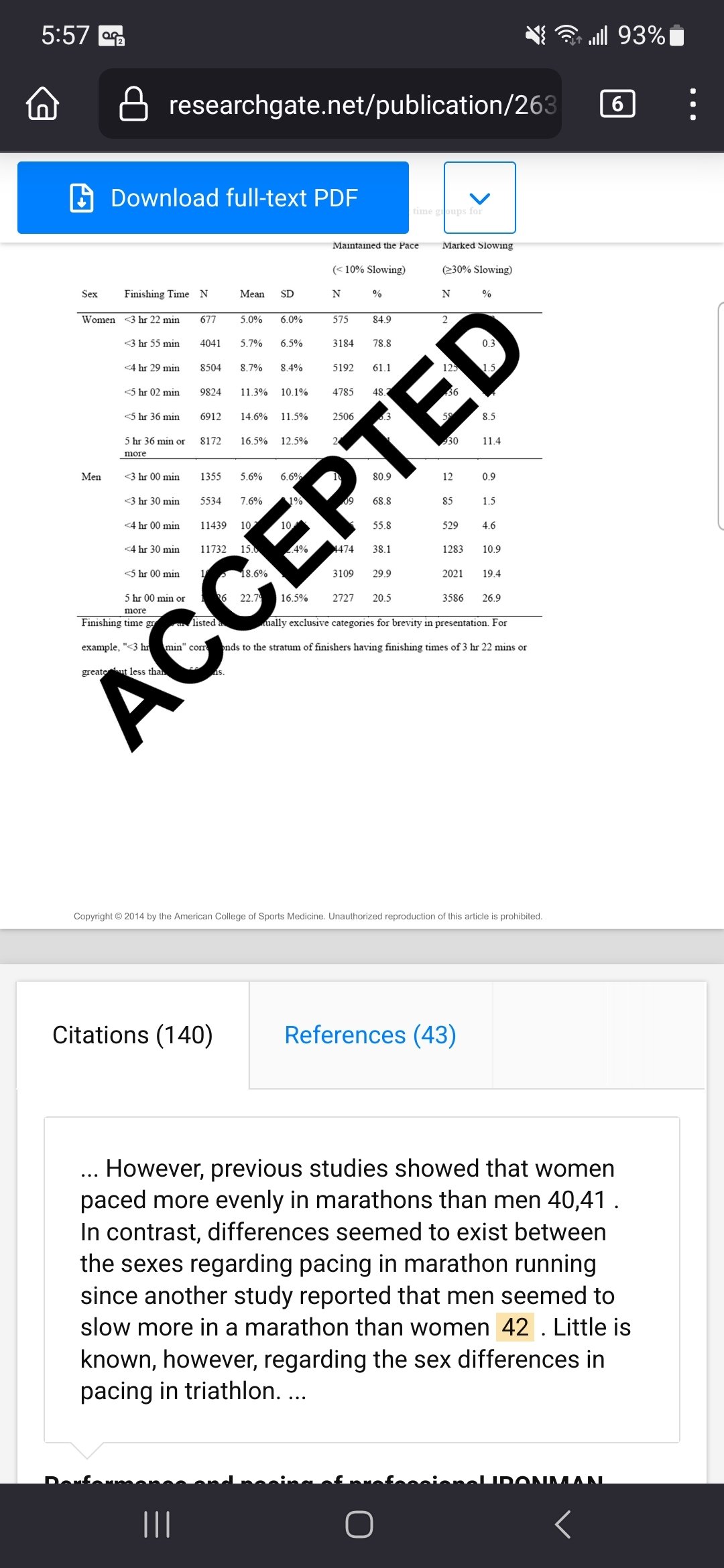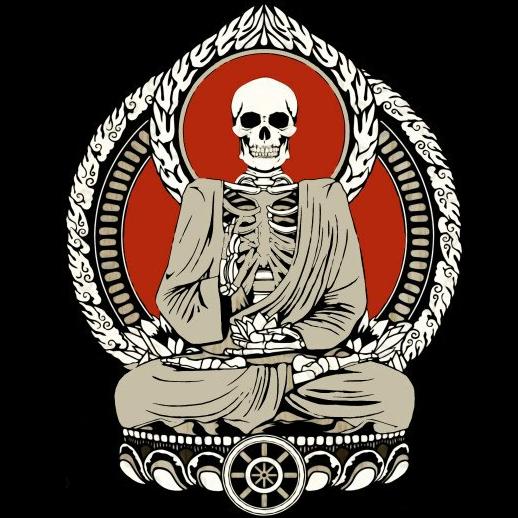Mounting evidence from exercise science indicates that women are physiologically better suited than men to endurance efforts such as running marathons.
We have a lot of marathon data. There is a large, consistent difference showing the opposite. This article is horrendously unscientific, so many claims, assumptions, and over summarizing and simplifying
It took me literally less than a minute to google and disprove that claim in this ‘article’:
The Olympic records for the event are 2:06:32 hours for men, set by Samuel Wanjiru in 2008, and 2:23:07 hours for women, set by Tiki Gelana in 2012.
This article is not scientific, its simply an opinion piece and should be treated as such. And honestly I don’t even think it was a good opinion piece. And why is it hosted on Scientific American?
And why is it hosted on Scientific American?
Because if you say things like this enough, people believe you
Men tend to be taller, so I’d think longer limbs are an advantage. I don’t pretend to know anything beyond that.
It took me literally less than a minute to google and disprove that claim in this ‘article’:
The Olympic records for the event are 2:06:32 hours for men, set by Samuel Wanjiru in 2008, and 2:23:07 hours for women, set by Tiki Gelana in 2012.
1.Wikipedia is not a scientific source.
- You are, if anything, showing that men are faster than woman. The claim the authors make is about endurance.
I found this study that seems to support their point.
“Men Are More Likely than Women to Slow in the Marathon”
This article is not scientific, its simply an opinion piece and should be treated as such. And honestly I don’t even think it was a good opinion piece. And why is it hosted on Scientific American?
I can’t read the article so unfortunately don’t have the grounds to agree or disagree with you. But I’d be carefull voicing my option like this when your only source is Wikipedia and isn’t speaking about the claim you are trying to disprove.
Edit: incase anybody is interested in reading some more real evidence instead of Wikipedia, this study goed deep into mens vs womans endurance and highlights a few problems with research focusing on males as the baseline.
Sex Differences in VO2max and the Impact on Endurance-Exercise Performance
Lmao, that wikipedia article has better listed sources than this so called ‘scientific article’ which, incidentally, has none…
What’re you talking about? The study linked has 43 references and has been cited 140 times. It even has their method and approach pretty clearly stated right at the start of the paper where they outline where they gathered their data from. Did you click the wrong link or something?
It doesn’t even have a list of sources that I can find. Where did you find it in the linked article ?!
So this is the link in question:
And you don’t see a research paper with citations?
Here’s a screenshot of the end of the paper that displays the links to the citations and references:

Here’s the full abstract as well just for further clarification:
Unlabelled: Studies on nonelite distance runners suggest that men are more likely than women to slow their pace in a marathon. Purpose: This study determined the reliability of the sex difference in pacing across many marathons and after adjusting women’s performances by 12% to address men’s greater maximal oxygen uptake and also incorporating information on racing experience. Methods: Data were acquired from 14 US marathons in 2011 and encompassed 91,929 performances. For 2929 runners, we obtained experience data from a race-aggregating Web site. We operationalized pace maintenance as the percentage change in pace observed in the second half of the marathon relative to the first half. Pace maintenance was analyzed as a continuous variable and as two categorical variables, as follows: “maintain the pace,” defined as slowing <10%, and “marked slowing,” defined as slowing ≥30%. Results: The mean change in pace was 15.6% and 11.7% for men and women, respectively (P < 0.0001). This sex difference was significant for all 14 marathons. The odds for women were 1.46 (95% confidence interval, 1.41-1.50; P < 0.0001) times higher than men to maintain the pace and 0.36 (95% confidence interval, 0.34-0.38; P < 0.0001) times that of men to exhibit marked slowing. Slower finishing times were associated with greater slowing, especially in men (interaction, P < 0.0001). However, the sex difference in pacing occurred across age and finishing time groups. Making the 12% adjustment to women’s performances lessened the magnitude of the sex difference in pacing but not its occurrence. Although greater experience was associated with less slowing, controlling for the experience variables did not eliminate the sex difference in pacing. Conclusions: The sex difference in pacing is robust. It may reflect sex differences in physiology, decision making, or both.
Wtf are you stupid, this isn’t the linked article in this thread? Did you just link some random study?
Men are faster than women in a marathon because they can maintain a pace for longer without slowing, that’s called endurance.
I can’t believe the superior endurance of men can even be up for debate, but clearly no one does enough exercise anymore for the self evident to reveal itself.
Endurance is not speed. If I can go 4 hours at 5 miles per hour before I have to take a break to rest and you can go 2 hours at 10 miles an hour before you have to stop, you’d be much faster than me in a 2 mile race. But that doesn’t have anything to do with endurance.
Why are you changing 2 variables. Endurance is your ability to perform at a certain level for a period of time. Kipchoge has more endurance than me because he can maintain my 800m pace for 26 miles. Speed is literally only a consideration for sprinting. As soon as you’re performing past that, it’s all endurance. And when we look at all tests of endurance; iron man, ultra marathon, military fitness, triathlon, etc etc. Men come out on top.
I think, better phrased, men as marathon and ultramarathon outliers tend to do better than women, but in terms of ultramarathons, I think women tend to do better on average. citation needed obviously but that’s going off the top of the dome.
More likely to slow from their original pace, but they still finish much faster.
And men have much better ultra-marathon records than women as well.
Who gives a shit if you’re still running full speed of your full speed isn’t fast enough to keep up on the first place?
Author does address this, btw. I still think it’s a bad argument. I just couldn’t fathom that they would say this and not further clarify.
they make claims and assumptions to address it, they dont really cite anything. Shit like this “The inequity between male and female athletes is a result not of inherent biological differences between the sexes but of biases in how they are treated in sports.” is a hypothesis, but it is not being stated as one, it’s being stated as fact. It’s a testable hypothesis, they could have controlled for the variable of pace setting runners that they bring up by only looking at statistics of running events that do not have this variable.
And like, the whole premise could be true, that women were also hunters, modern runners with modern sports medicine arent ideal evidence, that kind of endurance might not have been needed for their hunting, women are still humans and humans have the greatest running stamina of any animal. But besides capability, ancient humans also could have had roles determined by sex, it’s at least prevalent in other apes like gorillas. Either way is possible without more solid evidence and it’s pretty crazy to say one way or another is scientifically true.
I actually dont think testing this hypothesis is as easy as you think. You can’t just control for social biases when analyzing marathon data because these social biases are longitudinal. At a young age, women quickly learn from modern society that they are physically inferior to men. Because of this, the best bet for testing this hypothesis is to look at ancient societies, because these societies are largely independent from our modern society.
I mean, it’s also unlikely to be true. The difference between male and female bodies is the equivalent of years of high end steroid use.
If you wouldn’t let a man who had taken steroids for a decade and still takes them compete with other men, then you already acknowledge the biological advantage men have over women at physical sports.
I mean we also see a lot of what I would define as “outlier behavior” from men more generally. We see crazier olympic world records being set and broken, we see higher rates of suicide and violent crime, that sort of shit, which I’m personally kind of interested in figuring out the reason for. If you took some theoretical “average” man and some theoretical “average” woman I think they’d probably be a lot closer in terms of strength and stamina and shit than comparing athletes of different sexes to one another, I think the gap would be smaller.
If you took some theoretical “average” man and some theoretical “average” woman I think they’d probably be a lot closer in terms of strength and stamina
They would not. Testosterone is a hell of a drug.
The difference between the average man and the average woman is the same as the difference between a man who’s been taking steroids since he was 12, and an average man.
Estrogen is also a hell of a drug… It’s actully a point in the article that people give testosterone too much credit and estrogen not enough credit when it comes to how they affect the physique.
Your argument being founded on the effects of testosterone is not a good one…
This explains why my legs get tired when my wife drags me out shopping…
I’m a natural sprinter. Very fast on short distances. But the endless slog from one shop to the next, with no respite, no idea when it will end. When we come home I’m dead tired and empty. She’s dead tired and full.
I grew up in the rural southern US. I can confirm that women like to hunt. Maybe not as much as the dudes, but enough that I wouldn’t call it niche. I could totally see a society which relied on subsistence hunting have a lot of women in hunter role.
I live in New York and even here it’s not uncommon for women to also hunt lol. I’d say it’s mostly men but it’s not taboo at all for women
Where’s that damn summary bot
It is a very long article and the summary will not be able to properly catch the essence of it. Just take some time and read the article it is worth the read
That was a theory? I was under the impression Male/Female size differentiation was from men fighting men.
Apes fighting apes, maybe. AFAIK, size differences between the sexes has not increased since we first evolved. It’s part of our pre-human genetic heritage, not an evolutionary pressure on homo sapiens.
deleted by creator
I rather doubt that, because you see much larger male/female size differentiation in certain ethnicities than others, almost like there was some sort of pressure or selection geographically.
Size has much more to do with diet and environment than genes. It’s not uncommon for societies where food is scarce to feed boys more than girls. In some places fat wives are prized as an external indicator that her husband is wealthy. These relationships change with place and time, and faster than genetic selection could possibly act.
Well, they do make the rocking world go 'round
If you look at Polynesians, the women often tend to be bigger as well, maintaining the size disparity seen in other races and cultures. Wouldn’t this suggest that evolutionary pressures which will give preference to larger stature bodies are affecting the sexes equally?
If so, then the innate size disparity between sexes was written into our genetic code before we branched off.
I’m not an evolutionary biologist though.
No, one of the theories is actually that early homo sapiens groups were mostly closely related and interbred often. That’s what have them advantage over other species. We can see evidence of that in the DNA. Men fighting men came later, probably with first settlements and dependence on local resources.
You mean to tell me incest is what led to the success of the human race? That… actually explains a lot /s
No, it’s the opposite. Tribe was pretty much a big family. Neanderthals were reproducing mostly inside the tribe. Homo sapiens were reproducing with neighbouring tribes more often than Neanderthals. They had less incest and more varied genes. But this means that people had a lot of family in neighbouring tribe (like uncles and cousins) so they were less likely to fight them. That’s the theory.
Oh thank goodness
Humans be horny!
it do be
This is far from the first paper indicating this, despite how the media is framing it. There’s been more and more re-investigation of findings from the past century and earlier, with much of it not only finding that a number of the “warrior” skeletons discussed in the past were women, but also a lot of the physical evidence otherwise showing that women were involved in these activities.
Both men and women gathered and both men and women hunted. Often together and they may have had different overall skillsets depending on personal body structure and endurance. But there’s often enough of an overlap anyways that everyone could be involved in everything in some fashion.
The long-standing claim that women couldn’t be involved in hunting because of biology is like claiming that women can’t be muscular or lift weights because of biology. It’s a ridiculous claim.
I think there are two sets of claims in the article. The first set - women hunt - is blindingly obvious and it was stupid to ever think anything different. The second set - women are better suited for endurance activities is dubious and weakly argued.
Timothy Noakes is as good a scholar as we have in endurance exercise, and he points out that all of the ultramarathon evidence is a bit dubious because the sport does not attract the best runners. So East African runners dominate the marathon scene (especially the Kalenjins) but are virtually absent from the ultramarathon world. Why? No prize money or sponsorship. So the fact that European ancestry dominates the longer distance is more a function of who’s running than it is a difference in physiology.
So looking at the role of estrogen in race times requires some deeper understanding of who’s running and what their overall potential is. I’ll note that the ultra scene is generally populated by an older crowd who are following the " if I can’t go faster I’ll go longer" approach. So maybe men maintain competitive marathon times later into life so are slower to join the ultra scene?
Noakes also points out that a smaller body size works for women in several ways - smaller bodies use less energy to move, generate less heat, and shed heat more effectively. So without correcting body size, sex based comparisons are not deeply informative.
I looked for a study on this and found this here. It still says that men are faster than women, but if you compensate for that woman are over all more enduring in a Marathon.
The optimal pacing strategy is even splits. You want to leave everything on the course and finish with nothing in the tank (this is the “drop dead” pacing strategy Daniels wrote about in… “Oxygen Power”?). Negative splits means you went out too slow and positive splits means you went out too fast.
What the article shows is that men have larger positive splits which means they had worse performance against a theoretical optimum (even with that they’re still faster). Women were closer to optimal pacing strategy. The article says they don’t know if that’s physiological or tied to strategy and decision making.
Maybe women are just more realistic about their performance and pace appropriately?
and that’s why old women are always cold, while their husbands are boiling and turning down the thermostat.
Why do all those “findings” read like borderline retards trying to make HBO show plotlines into historical fact?
assumed evolution was acting primarily on men, and women were merely passive beneficiaries of both the meat supply and evolutionary progress.
He was superimposing the idea of male superiority through hunting onto the Ainu and into the past.
This fixation on male superiority was a sign of the times not just in academia but in society at large.‘’
At that time, the conventional wisdom was that women were incapable of completing such a physically demanding task
Scholars following Man the Hunter dogma relied on this belief in women’s limited physical capacities
Today these biased assumptions persist in both the scientific literature and the public consciousness.
“Powers of Estrogen” infographic.
This is quite the charged language and I’m not even halfway through. Throw in a bunch of other stuff about the Boston marathon and gender presentation in movies, yeah this isn’t that good of an article.
Before I’m downvoted into oblivion, we probably all took part in hunting. They’ve found the speed differences in running between ages and gender are not extreme, so we likely all went out running and hunting together. But men probably took on the more dangerous and physical aspects, but everyone with a spear is a more capable unit.
I read most of it, not bothering with full paragraphs when I could see the idea at the beginning, and from what I saw it doesn’t get any better.
It points out that the only physical sport activity they women excel at is ultra marathons. it then goes on to day that flexibility when it comes to family roles was important for survival. And this I absolutely agree with and it is certainly the case that women can hunt too.
But the author just seemingly completely ignores the argument that women can still fill the role, even if there is some kind of specialization that makes one sex generally better at one task then the other. The fact that we are different almost certainly means this is the case.
the only physical sport activity they women excel at is ultra marathons
And men still have much better record times at every ultra-marathon distance. Testosterone is a hell of a drug.
The author’s argument isn’t that women are faster but that they can sustain physical exertion for longer. I have no idea if that’s true, but citing marathon times really misses the point.
I’ll wait until there’s greater consensus in the field. These papers reek of scientists who have strong political motivations to find the answers they seek, and I’m not expert enough to critique their work.
Well you did just critique them. But without offering any meaningful criticism, just political feelings.
No, I pointed out that they self-identify as feminists and are claiming to have found evidence of a finding feminists would salivate over. Investigator bias is a real problem in scientific research and I see some pretty obvious red flags for it here. You’re the one who seems butthurt at someone not immediately accepting a political point you favor.
Really should not be a surprise to anyone. The patriarchy has done serious damage over the many many past and present generations
if you don’t want patriarchy you need to replace it with something else that maintains invested fathers or you end up with Fight Club.
What are some other -archies we could do? Matriarchy, obviously. Anarchy. Monarchy. Any other -archy?
Malarchy
Now listen here Bub.
This doesn’t shock me at all. My wife will hunt with me any day. She’s a champ and I’d be nothing without her.
Not surprising? In my community, hunters are overwhelmingly men so I would say that claim is surprising, to me at least.
I’m not sure how useful that information is, true or not.
There is definitely a subtle “moral-primitivism” that circulates society: women need to do womanly duties, and men need to bring the “meat”. Its a mythos that tries to rationalize itself based on an idea on how prehistoric humans lived (which is also assumed to be the more “authentic” way humans involved to live).
deleted by creator
In this case, the prey is contradictory evidence that has existed for centuries, and the heat exhaustion is the necessary scientific journalistic institutional rigor.
Or, conversely, the prey is male scientists’ egos, and the heat exhaustion is their own lack of integrity. 
It’s either rage bait or a sad example of incredibly stupid ‘woke science’.
Facts don’t care about your feelings.😎
Okay, but it’s not just size and strength. Women have better color discrimination, better landmark sense. Men have better time/speed sense. While pregnant the long gestational period makes the woman more at risk.
Women certainly can hunt, men can certainly harvest berries, but these other traits came about for reasons. If we were wrong as to why, that doesn’t change the differences.
Colour discrimination sounds super important to finding camouflaged prey animals and landmark sense sounds super important to wide ranging and unpredictable hunts. I dunno dude, unless you can cite experts in exolutionary biology supporting that inference, I’m going to say you’re taking out of your arse.
I’m remembering that color blindness is actually really good at bypassing certain kinds of camouflage too. Which sounds like the two would pair well together in hunting parties.
The extra color differation really only includes shades of red.
Landmark Sense
Lol…phew…lol.











